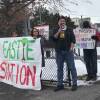For some communities that are homes to people of color and low income residents, the effects of climate change are disproportionate. Tonight at the Boston Public Library, GBH’s Morning Edition co-host Paris Alston will be moderating a panel about environmental justice for the latest iteration of the State of Race , a collaboration between GBH, World Channel, The Boston Globe and the Boston NAACP. One of the panelists, Boston College Assistant Professor Dr. Lacee Satcher, joined Alston for a conversation ahead of the event. This transcript has been lightly edited.
The State of Race: Environmental Justice will be held in person at the Boston Public Library’s GBH Studio and livestreamed for a virtual audience Thursday at 6 p.m. Find more information and get free tickets here.
Paris Alston: Dr. Satcher, first, could you just tell us a little bit about what environmental racism is? And is it by mistake? What are some of the communities that are most vulnerable and why is that?
Prof. Lacee Satcher: Environmental racism basically has a lot to do with the systematic and institutional historical processes of racism that situate Black communities, brown communities and other communities of color in neighborhoods where they have a disproportionate exposure to environmental hazards and also disproportionate access to environmental goods. And the way that racism works, as we know it here in America, is that Black Americans, other communities of color, are at the bottom of the totem pole in terms of the social hierarchy, and that places their neighborhoods in situations where society deems them less valuable.
Alston: Are there any places here in Massachusetts or in Greater Boston that immediately jump out to you as these places of concern?
Satcher: Well, absolutely. Now, I know there's tremendous social, cultural and economic value in my neighborhood of Roxbury, and in Dorchester and Mattapan. But in terms of some of the environmental inequality that I see, those same neighborhoods, full of life and culture and all of this beautiful value, are some of those environmental justice communities that I've also noticed.
Alston: And tell us about how that manifests. I mean, we already know that, as you're describing in those communities, exist vast socioeconomic disparities, health disparities, etc. How is that compounded by the effects of the climate crisis?
Satcher: For Roxbury and Dorchester in particular, one of the manifestations of the climate crisis is that it's getting hotter. And places like Roxbury and Dorchester that have all of this what we call impervious surface — so asphalt, concrete, steel, all these buildings — those buildings are really great at absorbing heat and also really great at giving it off. And so what scientists have found is that these neighborhoods, inner city neighborhoods like Roxbury and Dorchester, are actually 2 to 5 degrees hotter than other neighborhoods, like, let's say, West Roxbury or other neighborhoods with more trees and more greenspace. And so because of that lack of trees and green space, we see what we call urban heat islands.
Alston: And were they intentionally designed that way or is it just something that evolved over time?
Satcher: Well, I think that the more historical racist processes of redlining and segregation, especially here in the city of Boston, have situated Black Americans in particular, but other immigrant communities and other committees of color in Roxbury and Dorchester and Mattapan — it definitely didn't happen, you know, coincidentally. There's definitely some historical kind of a precedent for that.
Alston: And how prepared and equipped are these communities to combat these changes themselves? Or is it a situation where we have to see policy intervention to help them do that?
Satcher: That definitely has to be policy intervention. And now, we know, I know, that these communities are very resilient. But it isn't on them to solve this issue that they did not create. It's on policymakers and folks at the city level and at the state level to create policy. There's plenty of nonprofit organizations here in Boston that are helping to also counteract what we see in terms of environmental justice issues. So that's also important. It takes it's going to take everyone.
"For Roxbury and Dorchester in particular, one of the manifestations of the climate crisis is that it's getting hotter."-Lacee Satcher, Boston College
Alston: And we know that pollution is another big factor in a lot of these communities. I'm thinking about East Boston, for instance, where my co-host, Jeremy Siegel recently reported in his series The Price of Flight , how Logan Airport leads to higher rates of asthma and other significant health disparities there. And it also has a large Latino population. How hard is it to undo those longstanding disparities?
Satcher: Great point. And yes, the asthma rates in East Boston, because of its location near the airport, are much higher than other parts of Boston. But how to undo it? We can't move the airport. It's one of those things where it's like, human beings doing their human being thing, development, right? But we can work to counteract some of the negative impacts of living near an airport. Planting more trees; health care is really important, right? If asthma is going to be an issue, giving communities access to care when it comes to asthma and managing asthma. It's great to have communities that are racially homogenous. But we also need to think about what that means when communities are segregated so much as they are in Boston.
Alston: Oh, that's interesting. I mean, are you sort of saying that when we have mixed neighborhoods or even, maybe one would go so far as to say, like gentrified neighborhoods, that sometimes those climate effects can be mitigated because of who's there?
Satcher: Well, I'd say that gentrification, what we call urban renewal, is a double-sided sword. Because we know that with the introduction of higher-income, usually whiter, more educated residents — when those people enter a neighborhood, so do the resources, right? Acknowledging that, that whiteness and having wealth and higher income holds this sort of power that can change neighborhood contexts, I think that's important to recognize. I don't know if that means we should, you know, start —
Alston: Gentrifying all over the place.
Satcher: Right. I don't know. But I think until we change the minds — that's like a societal-level thing. We have to stop associating higher income with more value, and thinking about resources only when the neighborhood context or demographics look a certain way.





![Graduation 2024[64].jpg](https://cdn.grove.wgbh.org/dims4/default/21b7226/2147483647/strip/true/crop/1358x1358+637+0/resize/100x100!/quality/70/?url=https%3A%2F%2Fk1-prod-gbh.s3.us-east-2.amazonaws.com%2Fbrightspot%2F3a%2Feb%2Fd00d5cf6443ebee7970df751d611%2Fgraduation-202464.jpg)


